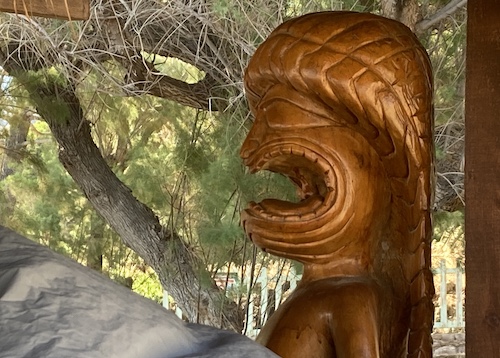(A new god of Eftalou)
I sometimes wonder about the tourists who lounge for days on end around the pool, just giving the endless Aegean a quick look, then preferring to dive into the bright blue, chemical water of the pool: like they’re afraid of the sea.
Recently I read some stories from the Belgian Congo*, presenting a merry procession of ghosts, magicians, underwater cities and strange water creatures like huge voracious crocodiles. After reading this book you will think twice before jumping into a river in Africa, or throwing yourself into the waves there. In the Aegean you might only meet saintly dolphins that save peoples’ lives. And of course the fish who might end on your dinner plate.
In ancient days when the Olympians were still ruling Greece, there also were some strange beings hanging around. And plenty of waters were very dangerous because of monsters with more than one head. Greek heroes were kept pretty busy fighting these creeps, according to the Greek myths which are as colourful as the tales from Africa.
However mythical Greece was very long ago. The more recent Greek folktales haven been stripped of their Gods and monsters and now look a little bleak compared to the tales from Africa. For example Greek folktales from the island of Lesvos** are stories of avarice, infidelity, greed and many of the other characteristics of capricious human beings. There might be a donkey, a goat, a dog or a cat taking part, but monsters and magicians seem to have been banned from Greece since the last centuries.
A master in folktales was the Lesvorian writer Argyris Eftaliotis***, his pen-name taken from the part of Lesvos he adored: Eftalou. He was born as Kleanthis Michaelidis in 1849 in Molyvos, travelled around the world, was part of the literary scene in France and died in Antibes in July 1923. According to his wishes, his remains were buried in his beloved Eftalou, the place he spent so many holidays and which inspired him to write enchanting poems and lively stories.
Eftaliotis wrote tales and poems not only about the common people, but his simple writing brought the literature to the people. He couldn’t stop talking about Odysseus, the famous hero from the works of Homer. He even worked at a new translation of this epic poem, but death took him before he could finish this work.
A little before the hot spring of Eftalou, high on one of the seven hills, under whispering pine trees, Eftaliotis’ house still stands musing while looking over waving olive trees and the Aegean sea. The hot spring is a bit in decay and has officially been closed, waiting for somebody to invest in its restoration. The popular beach just before the hamam already has been changed radically.
It has been nearly one century since the death of Eftaliotis. I wonder if he is turning in his grave, seeing how this beach has been appropriated by people that want to renovate the island according to their own wishes. An all inclusive hotel has put a wooden pavilion on the beach with colonial furniture and two statues of foreign deities, looking angrily over the Greek water. They could have come straight from those tales from the Belgian Congo. With an enormous fleet of beach bags (a modern version of a beach bed) the owner has not left any space for local swimmers who prefer to spread their beach towels over the warm sand.
The other half of the beach has been filled with modern sunbeds by a man who has big plans for a wellness centre. Therefore he tore away all the greens from the previous Eftalou restaurant and built the terraces up with plenty of concrete. He also works with foreign gods – placing the head of a Buddha on a table – seemingly with no feeling at all for the geographical and historical characteristics of a place, once so beloved by lots of people. Even tough the beach has filled up with masses of bathers, many of them also swimming in the sea. But the beach could have been anywhere now: at the Spanish, Italian or even Turkish Coast.
I might be an old spinster, loving a Greek traditional island, but more and more journalists warn for the monster of the all consuming mass tourism. Everything has to become bigger, more luxurious and more expensive, leaving less and less space for the locals and the nature. Athens groans because of the huge number of tourists, Mykonos and Santorini already have been crushed; but Lesvos does not seem to have learned anything from this. Where he alive, Eftaliotis would have plenty to write about all of this.
* Ngando by Paul Lomami-Tshibamba. In Dutch by publisher De Geus 2023. In French by publisher by Lokole, 1982
**Greek folktales from the island of Lesvos. Collected by: Frosso M. Zourou, translated in English by Rom Gudas (Politeia book)
*** One of his most traditional books,Νησιώτικες ιστορίες, has been translated in English: Modern Tales of the Greek Islands (T. Nelsons & sons, 1942)











